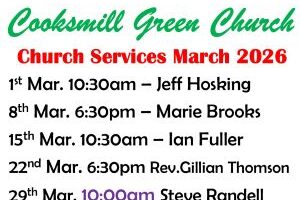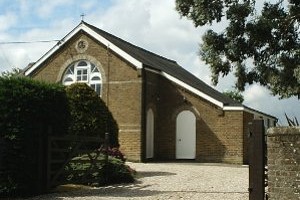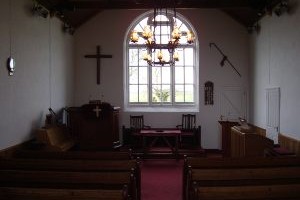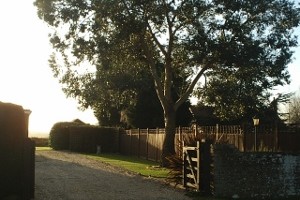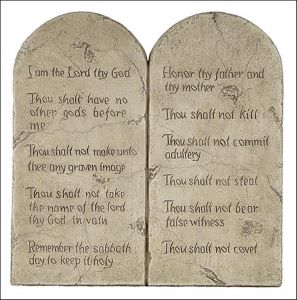Thought for the Month February 2024
This month’s thought is an extract from an address given at Cooksmill Green Church 11th February 2024
Boundaries and Freedom
When I heard the news last week about the conviction of the youngsters who murdered Brianna Ghey, the things that were said about them, their motives, I knew I had to think again about today’s service. Sadly, as we know, this is not the only tragic event of this nature to occur in recent times, murders and attacks with teenage victims and teenage perpetrators. But of course it’s not exclusive to teenagers, take the recent acid attack by a 35-year-old man on a mother and her children.
Together with all the other horrific world news we hear, there’s a danger our senses become dulled, our feelings can be reduced to a resigned shrug.
For some years now, some in society have dictated that people must be free, including the very young, who must be allowed to be free, free to express themselves any way they like, free to make choices and so on. Good arguments can be made for this; there can be times and places for such freedoms. But!
Given the dangers (now finally being acknowledged) of some modern social media, even children from loving, caring families – who teach right and wrong – can be vulnerable and subversively led into destructive activities – or become victims to online activity. This, plus the trend for a ‘freedom of thinking anything goes’ culture that’s crept into parts of society, makes the need for boundaries seems ever more important to me.
The balance between freedom and boundaries is tricky, but in a ‘civilised’ society any freedoms must surely be accompanied by responsibilities, responsibilities that need to be taught and learnt. There have to be boundaries of right and wrong, dare I say it, Moral Boundaries! Whilst some morality may be innate, most I would suggest needs to be taught, and the earlier the better. Waiting for lessons given by teachers at school, important though they are, is too late. Teaching and examples, given by parents and/or guardians in the early years is vital, Grandparents, Aunties, Uncles can also play a big role.
Then later on, teachers, politicians, celebrities – especially those with massive on line influence play a key role in shaping people’s boundaries, or lack of. But here in lies a problem. Whose boundaries, morals, rules… should they and we follow? Pharisaic, Rabbinic, Vatican, Church of England Synod, Humanist, New Age…. And who is it that sets these anyway? And what happens to freedom?
There have always been violence and teenage gangs, just look at the Mods and Rockers of the 60s, but there is so much more in the equation today. Harder and more addictive drugs, social media bullying – where cowards can bully and hide, web sites promoting suicide, self-harm, violence and yes, pornography. Much has changed in recent times, the problems that have always been there have been exacerbated. We’re living in a different world
I’m not suggesting for one minute we should go back to Victorian ‘straight jacket’ boundaries, or anything like them, these were no better than the Pharisaic laws Jesus was railing against in our reading. but I fear some in our current generations, young and old, have become products of (and I use the term broadly) the ‘Secularist’ free thinking anything goes influences that have grown in the past few decades, the fruits of which I believe we are now seeing. Given new dangers I’ve mentioned, I ask myself again, within the myriad of influences that secularism encompasses, who is it that sets the moral compass? Who is it in these cultures/traditions, that says what is right or wrong (pure or impure)? We see the danger that sects and cults with their various agendas can bring to the world – and in this, sadly, we cannot ignore those who manipulate religious teachings in the same way.
It seems to me that the Bible and the teachings of Jesus – un-manipulated – are a pretty good start. In the reading from Mark we see how Jesus warns against the manmade manipulation of religious laws (even if a few of them are well intentioned). Jesus tells the Pharisees, and us, that the desire for a ‘pure heart’ is the route to true purity, not how we wash our hands.
So which rules and commands do we follow? Well there are the Ten Commandments of course, another pretty good start point, but Jesus, when asked by a scribe which were the most important, picked just two, he said:
29 “The most important one,” …, “is this: ‘Hear, O Israel: The Lord our God, the Lord is one. 30 Love the Lord your God with all your heart and with all your soul and with all your mind and with all your strength.’ 31 The second is this: ‘Love your neighbour as yourself.’ There is no commandment greater than these.” (Mark 12:29-31 N.I.V.)
The remaining eight commands, which Jesus didn’t mention, are all ‘do not’ commands! So why are the first two more important? Outwardly they are so simple and they can set us free. How? Well, if we can truly love God and truly love our neighbours in the way Jesus implies, the need for any ‘do not’ commandments became redundant. They would simply be the default position. Sadly, the implementation of these first two commands is not so simple due to ‘Human Nature’ or ‘The Human Condition’, call it what you will. The need for the ‘do not’ commandments and the boundaries they provide are still needed.
Much as we may not like it, we all need to have, and to understand, boundaries of various types – the dos and the do nots – acceptable to God and to our neighbours, respect, patience, understanding God’s boundaries, not boundaries designed to suit a certain group’s agenda. drawn so tightly they choke out love.
On a positive note, there are voices who call for help for the homeless and hungry, better care for the elderly and disadvantaged, proper care and education of our children, equality of opportunity, tolerance of those with different cultures and life styles, all of which is to be welcomed and encouraged. So please don’t be discouraged by what I’ve said so far.
Teaching boundaries is the responsibility of us all, parents, grandparents, aunties, uncles, teachers ‘The Church! And yes even politicians and government. But as we try to set those boundaries it’s worth noting what Donald W McCullough penned an article in ‘Christianity Today’ “Serving a Wild Free God” back in 1955in it he wrote:
God does not always respect the boundaries we create and carefully protect. Drawing lines in the theological sand may serve our purposes, separating good guys from bad guys and can be helpful, because it is hard to know that you’re on the inside unless you know who is on the outside. But God has a studied disregard for anxieties of this sort. Prodigal grace keeps spilling over into alien territory.1
Does our Love and care spill over into alien territory? To enemy territory?
We all have a part to play, I pray God will show us each what our part is in setting God’s boundaries which can ultimately set us all free.
STEVE.
Love the Lord your God with all your heart and with all your soul and with all your mind and with all your strength.’… ‘Love your neighbour as yourself.’ There is no commandment greater than these.”
1David E. Garland (1996) The NIV application Commentary – Mark Zonondervan
Reading: Mark 7: 1-23 N.I.V.
That Which Defiles
7 The Pharisees and some of the teachers of the law who had come from Jerusalem gathered around Jesus 2 and saw some of his disciples eating food with hands that were defiled, that is, unwashed. 3 (The Pharisees and all the Jews do not eat unless they give their hands a ceremonial washing, holding to the tradition of the elders. 4 When they come from the marketplace they do not eat unless they wash. And they observe many other traditions, such as the washing of cups, pitchers and kettles.)
5 So the Pharisees and teachers of the law asked Jesus, “Why don’t your disciples live according to the tradition of the elders instead of eating their food with defiled hands?”
6 He replied, “Isaiah was right when he prophesied about you hypocrites; as it is written:
“‘These people honour me with their lips,
but their hearts are far from me.
7 They worship me in vain;
their teachings are merely human rules.’
8 You have let go of the commands of God and are holding on to human traditions.”
9 And he continued, “You have a fine way of setting aside the commands of God in order to observe your own traditions! 10 For Moses said, ‘Honour your father and mother,’ and, ‘Anyone who curses their father or mother is to be put to death.’ 11 But you say that if anyone declares that what might have been used to help their father or mother is Corban (that is, devoted to God)— 12 then you no longer let them do anything for their father or mother. 13 Thus you nullify the word of God by your tradition that you have handed down. And you do many things like that.”
14 Again Jesus called the crowd to him and said, “Listen to me, everyone, and understand this. 15 Nothing outside a person can defile them by going into them. Rather, it is what comes out of a person that defiles them.” [16]
17 After he had left the crowd and entered the house, his disciples asked him about this parable. 18 “Are you so dull?” he asked. “Don’t you see that nothing that enters a person from the outside can defile them? 19 For it doesn’t go into their heart but into their stomach, and then out of the body.” (In saying this, Jesus declared all foods clean.)
20 He went on: “What comes out of a person is what defiles them. 21 For it is from within, out of a person’s heart, that evil thoughts come—sexual immorality, theft, murder, 22 adultery, greed, malice, deceit, lewdness, envy, slander, arrogance and folly. 23 All these evils come from inside and defile a person.”
